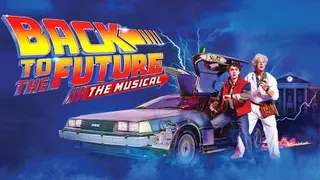October 15, 2020
Review: 'Star Trek: Discovery - Season Three' Proves Wherever You Go, There You Are
Kilian Melloy READ TIME: 4 MIN.
"Star Trek: Discovery" speeds through space and time to land in a new season and a completely transformed galaxy. After a pitched battle with an artificial intelligence sent the crew on a desperate escape through a time-traversing wormhole at the end of Season Two, the ship and crew now find themselves in the 32nd century. Things have changed, and not for the better: Critical resources have been depleted, a galaxy-spanning disaster has occurred, and the Federation (what's left of it, anyway) has, like Luke Skywalker in "The Force Awakens," decamped for parts unknown.
Wormholes are tricky, as Commander Burnham (Sonequa Martin-Green) realizes when she arrives at her destination – a far-flung planet frequented by ruthless "couriers," where aliens mix and mingle, but not in the old friendly Federation way. Here, it's every sentient being for themselves... and Burnham, a naive newcomer, has to adapt to the ways of the future in a hurry if she hopes to track down the whereabouts, and the whenabouts, of her crewmates aboard Discovery, which has not arrived along with her at the same point in time. Luckily, she has a new friend, Cleveland Booker (David Ajala) to show her the ropes... when he's not trying to rip her off.
But what about the Starship Discovery? Not to fear: Acting Captain Saru (Doug Jones), along with Ensign Tilly (Mary Wiseman), same-sex couple Paul Stamets (Anthony Rapp) and Dr. Hugh Culber (Wilson Cruz), and the badass formerly known as Empress Georgiou (Michelle Yeoh, who's rumored to be getting her own series after this season of "Discovery"), aren't lost in space. They have their own rude introduction to this wild west of a future after the ship crashes down on an ice-bound planet, where there's only a handful of skeptical miners to help them face off against the local bad guys... in this case, a vicious courier who wants to steal the ship and everything on it. (As it happens, there are still avid collectors of antiques in the 32nd century, an the ship has other, even more valuable resources that help power the future's upside-down socio-economic system.)
Needless to say, this isn't the glorious future of an evolved humanity that Gene Roddenberry originally foresaw, but that doesn't mean that virtue won't still overcome adversity – and that, to judge from the four episodes made available for review, is the main story arc of this new season. It's a timely message.
"Star Trek" has always commented on the politics and social debates of the day. That was true in 1966, when the Original Series first premiered; it was true in 2017, when "Discovery" hit the airwaves with a first season that included a side-trip to a Trumpian "mirror universe" and the series had a chance to reflect, as it were, on what people who believe in common decency are supposed to do when the world around them seems to lose those values.
That sense of current real-world critique is alive and well in the new season, particularly in the Jonathan Frakes-directed third episode, in which Burnham has a chance to wax allegorical. "Everything that we dedicated out lives to disappeared into madness," she ruminates. "We thought we could imagine a future and it turns out we were wrong."
But the compromised future where Burnham and her friends find themselves has its upsides along with its challenges. Burnham herself describes it as being like "a strange, beautiful, terrible dream." Once she grows into her new circumstances, she seems to like it; indeed, she seems "lighter," according to another character, and Martin-Green's warm, barely verbal response to the compliment shows how much more comfortable the show's lead character has become in her own skin than she used to be.
The new season does has its flaws, and they're the same as those from the previous two seasons. Some of the scenes are draggy, some of the dialogue feels overly puffed up on sentiment, and there are moments of overacting that seem designed to fill the gaps and match the overstated dialogue. Also, "Star Trek" has a weakness for too-easy solutions, and we see that here when parties that have long been acrimoniously opposed have a quick chat and realize that they can all just be friends. Decades of distrust seem to vanish in an instant. (If only the rents and divisions of the real world were so easy to mend. Still, you have to start somewhere.)
But there's also a sense of growth and courage, along with themes of connection and the restoration of dialogue between (ahem!) alienated factions. In keeping with these themes, the show visits the planet Trill in one episode, a trip that serves as a steadying touchstone for the franchise as it traverses this truly strange new world. It's a welcome diversion that plays into the introduction of a pair of new characters that might just represent a whole new level of diversity within the infinite combinations of familiar tropes that the many different takes on "Trek" have explored through the years. (The fact that the show has kept grumpy engineer Jett Reno, played by out comedian Tig Notaro, is another of the new season's many delights.)
The third season of "Star Trek: Discovery" might be the boldest journey any "Star Trek" series has taken yet. It's a reminder that even the most arduous journey is a matter of what we choose, and with whom we choose to share it.
The third season of "Star Trek: Discovery" premieres Oct. 15 on CBS All Access and, outside the U.S., Oct. 16 on Netflix.
Kilian Melloy serves as EDGE Media Network's Associate Arts Editor and Staff Contributor. His professional memberships include the National Lesbian & Gay Journalists Association, the Boston Online Film Critics Association, The Gay and Lesbian Entertainment Critics Association, and the Boston Theater Critics Association's Elliot Norton Awards Committee.






